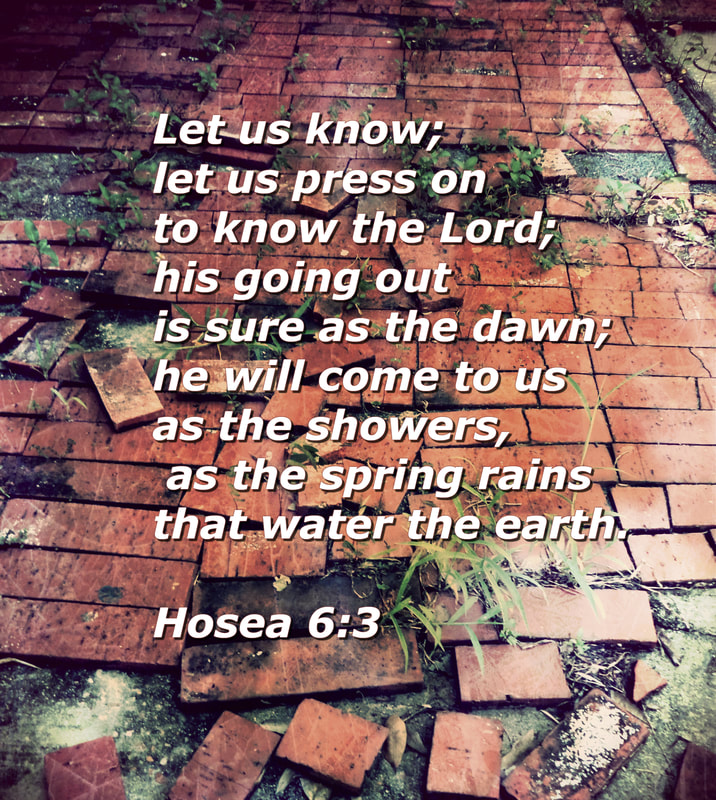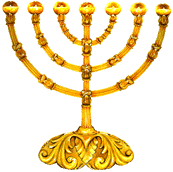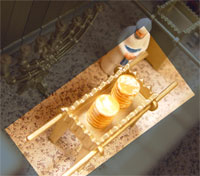And David answered the priest, “Truly women have been kept from us as always when I go on an expedition. The vessels of the young men are holy even when it is an ordinary journey. How much more today will their vessels be holy?”
David cared about the priest and did not want to drag him into treason. He cared about the statutes of the LORD and would not break them by taking the showbread unless he was clean to take it. David’s sense of righteousness, came not from wanting to “be good” but from love of God, His people, and His Word. David’s righteousness came from faith. Romans 4:4-8 reads,
Now to the one who works, his wages are not counted as a gift but as his due. 5 And to the one who does not work but believes in him who justifies the ungodly, his faith is counted as righteousness, 6 just as David also speaks of the blessing of the one to whom God counts righteousness apart from works:
7 “Blessed are those whose lawless deeds are forgiven,
and whose sins are covered;
8 blessed is the man against whom the Lord will not count his sin.”
Doeg, the Edomite, Saul’s chief herdsman was present there that day and saw David’s interaction with Ahimelech. As soon as he was able to leave for Jerusalem, he did. He reported to Saul that David was there. But David left and went to Gath. There the servants of King Achish recognized David as Saul’s enemy and brought him to the king. But David understood the gravity of the situation and feigned insanity. The king wanted nothing to do with a madman. (1 Samuel 21:10-15).
Now David went to the Cave of Adullam. People heard he was there. He was joined by family, by people who were disillusioned with Saul, people who were in debt, bitter and distressed. He was no longer alone. He had an army of about 400 men with him (1 Samuel 22:1-2). He was now responsible for these people and he took that responsibility seriously. He would one day be their king but now he was a man on the run. David wanted to ensure his parents’ safety. He went to the King of Moab (His great grandmother Ruth’s people) and asked for their asylum with him. King Mizpeh said yes and warned David to go to Judah (1 Samuel 22:3-5).
David again showed his concern for other people. His parent’s safety was important and he risked his own for their sake. He saw the people who were suffering under Saul’s administration and let them gather to him. David was not perfect, but he was righteous. David was not perfect, he sinned but he was blameless. He was counted righteous because of his faith in God. In Psalm 26:1-3 David writes,
Vindicate me, O Lord,
for I have walked in my integrity,
and I have trusted in the Lord without wavering.
2 Prove me, O Lord, and try me;
test my heart and my mind.
3 For your steadfast love is before my eyes,
and I walk in your faithfulness.
David loved God’s law but He understood that the law was based on love of God and love of people. He loved God’s law enough to meditate on it enough that he comprehended the crux of righteousness is faith and keeping the law is done in love of God.
Psalm 119:97-98 reads,
Oh how I love your law!
It is my meditation all the day.
98 Your commandment makes me wiser than my enemies,
for it is ever with me.
Deuteronomy 6:4-6 records the Greatest Commandment,
Hear, O Israel: The Lord our God, the Lord is one. 5 You shall love the Lord your God with all your heart and with all your soul and with all your might. 6 And these words that I command you today shall be on your heart.
In Leviticus 19, The Lord goes over the Ten Commandments and wraps it up with verse 18 saying,
but you shall love your neighbor as yourself: I am the Lord.
Righteousness is not found in rituals or rules. It is found in loving people as our God loves, as Jesus demonstrated. Jesus said, “A new commandment I give to you, that you love one another: just as I have loved you, you also are to love one another. By this all people will know that you are my disciples, if you have love for one another.” (John 13:34-35). 1 Peter 4:8 reads,
Above all, keep loving one another earnestly, since love covers a multitude of sins.
David went to Judah to the forest of Hereth (1 Samuel 22:5). But now Saul, Doeg, and his men went to Nob to find out where David was. Saul quickly demonstrated that the only person he cared about was himself. He had no regard for the LORD and no regard for people. 1 Samuel 22:6-8 in The Message reads.
Saul got word of the whereabouts of David and his men. He was sitting under the big oak on the hill at Gibeah at the time, spear in hand, holding court surrounded by his officials. He said, “Listen here, you Benjaminites! Don’t think for a minute that you have any future with the son of Jesse! Do you think he’s going to hand over choice land, give you all influential jobs? Think again. Here you are, conspiring against me, whispering behind my back—not one of you is man enough to tell me that my own son is making deals with the son of Jesse, not one of you who cares enough to tell me that my son has taken the side of this, this . . . outlaw!”
Doeg saw his chance to look good to the king verses 9-10 read,
Then answered Doeg the Edomite, who stood by the servants of Saul, “I saw the son of Jesse coming to Nob, to Ahimelech the son of Ahitub, 10 and he inquired of the Lord for him and gave him provisions and gave him the sword of Goliath the Philistine.”
Saul reacted as his hate directed him, he was on the warpath. He summoned Ahimelech and questioned him. Verses 13-15 record it,
And Saul said to him, “Why have you conspired against me, you and the son of Jesse, in that you have given him bread and a sword and have inquired of God for him, so that he has risen against me, to lie in wait, as at this day?” 14 Then Ahimelech answered the king, “And who among all your servants is so faithful as David, who is the king's son-in-law, and captain over your bodyguard, and honored in your house? 15 Is today the first time that I have inquired of God for him? No! Let not the king impute anything to his servant or to all the house of my father, for your servant has known nothing of all this, much or little.”
Saul ordered the priest’s and his family’s death, then added all the priests to the execution order out of his fear that they followed David. But his guard refused to kill the priests of the Lord. So Saul looked to Doeg and ordered him to do it. Doeg, who was not a Jewish man but an Edomite, killed 85 people, men, women, and children that day in Saul’s name. Saul, Israel’s anointed king had no qualm murdering those 85 people, the men who were priests of God, chosen by Him to serve. Saul’s fear and hate had eradicated any sense of righteousness, love, or goodness.
Abiathar, Ahimelech’s son escaped and fled to David and told him everything that had happened. David was devastated and took responsibility for the slaughter and offered protection to Abiathar.
David was a man after God’s own heart. He pursued God, He pursued His kingdom, and He pursued His righteousness. He understood that pursuing God means loving people, caring about their welfare and doing something about it. Believer, do you pursue God’s righteousness and God or do you pursue self-righteousness and self? It’s okay to trust God and let Him be God to you. He promised that if we do that, He will take care of everything else (Matthew 6:33). God doesn’t want your rituals or your sacrifices. He wants you in a relationship. He wants you to know Him, to chase after His heart, and to love Him with all of yourself. He wants a love based on trust and faith. Hosea 6:6 reads,
For I desire steadfast love and not sacrifice,
the knowledge of God rather than burnt offerings.
Believer, being a person after God’s own heart means that we will pursue righteousness. Righteousness is not based on following rules and commandments but based on God’s grace and love. Righteousness is given by faith and lived out in love.




 RSS Feed
RSS Feed
